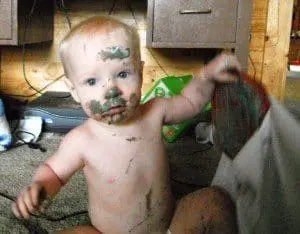Just because your baby doesn’t understand that pulling mom’s hair out or sticking bananas in the VCR is wrong, doesn’t mean that they won’t still do it. Infants pose a difficult disciplinary conundrum. They become mobile and capable of doing dangerous and naughty things, but haven’t developed mentally enough to comprehend concepts like right and wrong, action and reaction, crime and punishment, and positive reinforcement. Truthfully, even if they did, they don’t have the attention span or memory for it to do any good as far as behavioral improvement. I know sometimes staring into those big baby eyes you could swear they know just what they’re doing and are doing it just the thwart you, and it’s in that moment as a parent you’re stuck wondering, “What do I do now?”
When should you start disciplining your baby?
The thing is, every baby develops at a different rate. Your baby may be developmentally advanced enough to understand one or more of the concepts required for discipline and praise to be effective. He or she may have the memory and attention span for it too. The great thing is starting discipline right away doesn’t hurt anything. Even if it isn’t doing any good at all, it’s also not doing any harm. Plus, it leaves you feeling like you did something, which can help you from becoming overly stressed or feeling helpless or angry when behavior becomes especially trying. You can start discipline and praise from the day your baby is born.
How can you discipline an infant exactly?
Never spank, hit, or criticize. I don’t take stance on the to-spank-or-not-to-spank subject; in my opinion it’s to each his/her own. However, when it comes to an infant, which the discipline is likely wasted on anyway, you should never use physical punishment. Your baby is still developing in an array of ways, and while babies may not be made of glass, if you do accidentally hurt your baby the effects are forever. At any stage, you should also avoid calling your baby bad. Focus your negativity on the act, not the child.
Be consistent. It’s important your reaction to bad behavior is always the same. This is how the reaction becomes committed to memory. Be careful that your reaction is not amusing as well. In the beginning, you can play around with options to find out what works for your baby’s personality type but lock it in before the toddler stage. Some infants react well to strong “NO!,” others find that hilarious. Some infants respond well to momentary removals of attention, while others could care less. In most cases, distraction does work well. Simply redirect the behavior to something new explaining why. At any age, always explain why you are doing what you’re doing, as well as why something is right or wrong. Whether this information is comprehended now is irrelevant. It’s a good habit, helps improve your baby’s vocabulary, and you never know, they may understand. Remember to offer praise for good behavior too.
What else can you do about bad baby behavior?
Sadly, baby geniuses aside, chances are your disciplinary efforts will be more for your sake than for theirs in the beginning. What you can do is keep your baby’s play areas as safe as possible, so that while bad behavior may be annoying, it’s not dangerous. Also try to keep play areas free of safe-but-messy no-nos. You goal is to remove the opportunity to be bad, until the developmental capacity is there to know what bad is.

